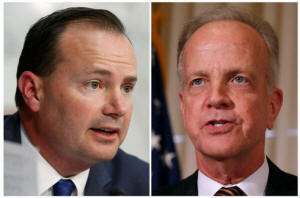|
Republicans divided after second
healthcare bill collapses
 Send a link to a friend
Send a link to a friend
 [July 18, 2017]
By Richard Cowan and Yasmeen Abutaleb [July 18, 2017]
By Richard Cowan and Yasmeen Abutaleb
WASHINGTON (Reuters) - Republicans in the
U.S. Congress were in chaos over healthcare legislation after a second
attempt to pass a bill in the Senate collapsed late on Monday, with
President Donald Trump calling for an outright repeal of Obamacare and
others seeking a change in direction toward bipartisanship.
"Regretfully, it is now apparent that the effort to repeal and
immediately replace the failure of Obamacare will not be successful,"
Senate Majority Leader Mitch McConnell said in a statement.
Two of McConnell's Senate conservatives announced just hours earlier
that they would not support the Republican leader's latest version of
legislation to repeal portions of President Barack Obama's landmark 2010
healthcare law and replace them with new, less costly healthcare
provisions.
With Republican Senators Mike Lee and Jerry Moran joining Senators Susan
Collins and Rand Paul in opposition - and amid a solid wall of
opposition from Democrats - McConnell no longer had enough votes to pass
a Republican healthcare bill in the 100-member Senate.

It was the latest in a series of healthcare setbacks for Republicans,
despite their control of both chambers of Congress and the White House.
It also came after seven straight years of promising voters that they
would repeal Obamacare if they were to control Congress and the White
House, only to find that the public liked Obamacare more than their
proposed substitutes, according to public opinion polls.
The non-partisan Congressional Budget Office has determined that the
various versions of Republican healthcare legislation would result in
anywhere from 18 million to 23 million people losing their health
insurance.
However, Republicans argue that Obamacare is a government over-reach and
costs too much money.
MAJOR BLOW
Monday's developments had an immediate impact on financial markets as
Asian shares stepped back from more than two-year highs on Tuesday and
the dollar extended losses. [nL3N1K907K]
In the United States, the latest setback delivered a major political
blow to Trump, who has failed to win any major legislative initiative in
the first six months of his presidency.
In response, Trump said on Twitter Congress should immediately repeal
Obamacare and "start from a clean slate" on a new healthcare plan. He
said Democrats would join such an effort, even though they have refused
to have any part of an Obamacare repeal.

McConnell, apparently backing Trump's latest approach, announced that he
would try to bring legislation to repeal Obamacare to the Senate floor
in coming days, but with a two-year delay in implementation to assure a
smooth transition.
That idea was rejected by Republicans months ago in favor of
simultaneously repealing and replacing Obamacare in order to avoid chaos
in insurance markets.
Republican Senator John McCain, who is recovering from surgery in his
home state of Arizona, urged a much different change of course -
bipartisanship.
"The Congress must now return to regular order, hold hearings, receive
input from members of both parties" and pass a bill that "finally
provides Americans with access to quality and affordable health care,"
McCain said in a statement.
[to top of second column] |

A combination photo shows U.S. Senator Mike Lee (R-UT) speaking in
Washington March 21, 2017 and U.S. Senator Jerry Moran (R-KS)
speaking in Washington, January 8, 2015 REUTERS/Joshua Roberts (L)
and Larry Downing/File Photo

"START FROM SCRATCH"
It was not yet clear whether Republicans would get behind the latest
Trump-McConnell plans or McCain's prescription.
Like McCain, Senate Democratic leader Chuck Schumer held out the
possibility of bipartisanship. In a statement, he urged Republicans
to "start from scratch and work with Democrats on a bill that lowers
premiums, provides long-term stability to the markets and improves
our health care system."
Republicans in Congress had been hoping to settle on a healthcare
bill before an upcoming August recess so they could begin work in
earnest in September on a wide-ranging rewrite of the U.S. tax code.
House of Representatives Speaker Paul Ryan had no immediate comment
on the next steps he would like to see following the collapse of the
healthcare bill in the Senate.
One health industry lobbyist said that, in the run-up to the second
collapse of the Senate's healthcare bill this summer, there was
growing anger among senators over proposed Medicaid cuts and an
amendment by Senator Ted Cruz that would have allowed insurance
companies to offer cheaper plans that did not have Obamacare's
guaranteed coverage of services such as maternity care.

A similar version of the Senate bill passed the House in May but
passage in the Senate was always expected to be more difficult,
given the deep tensions between moderates and conservatives.
Moderates worry about cuts to the Medicaid health insurance program
for the poor and disabled, while conservatives want those cuts as
well as a more dramatic dismantling of Obamacare's framework.
The first version of the Senate bill failed to attract enough
support, forcing McConnell's office to revise it in a bid to make it
more palatable. That version was released last week.
Senator Bernie Sanders, the former Democratic presidential
candidate, celebrated what he termed the "collapse" of the
Republican effort.
"This is a great victory for the millions of Americans who stood up
and fought back against this dangerous legislation," Sanders said in
a statement.
(Writing by Richard Cowan, additional reporting by Susan Cornwell,
Steve Holland and James Oliphant; Editing by Paul Tait)
[© 2017 Thomson Reuters. All rights
reserved.]
Copyright 2017 Reuters. All rights reserved. This material may not be published,
broadcast, rewritten or redistributed.
 |